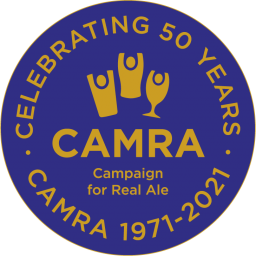CAMRA 50th Anniversary

 Our Founders from the top - Bill Mellor,
Our Founders from the top - Bill Mellor, Michael Hardman,
Michael Hardman,
 Jim Makin,
Jim Makin,
 and Graham Lees
and Graham Lees
CAMRA was formed in March 1971 by Bill Mellor, Michael Hardman, Jim Makin and Graham Lees on a trip to Ireland. At the time, the ‘Big Six’ brewers (Allied, Bass, Courage, Scottish & Newcastle, Watneys and Whitbread) had monopolies on entire regions of the country, owning hundreds of pubs that could only sell their brews. They were pushing tasteless kegged beer onto consumers because it was easier to produce, store and serve, and as a result quality real ale was incredibly hard to find. In fact, there were just five bottle-conditioned beers in existence in the world.
The early years were marked by the recruitment of members and setting up what would soon be Europe's largest consumer organisation. In 1972 What’s Brewing newspaper was founded, followed shortly by the first edition of the Good Beer Guide in 1974 - originally a short pamphlet compared to the ‘bible’ produced 48-years later. These were some of the first beer/ pub centric publications produced in the UK.
That same year the first-ever beer festival in modern times took place in St Albans, boasting 26 different casks from 14 brewers. In 1975 the Great British Beer Festival was held at Covent Garden and was a roaring success. Volunteers worked flat out throughout the weekend to source more beer for the festival which kept running out.
It wasn’t very long until CAMRA started to get noticed. The ‘Big Six’ started to respond to the calls for cask ale, and in 1976 Allied Brewing introduced Burton Ale, it’s first real ale ever produced. Watneys soon followed with a cask conditioned beer, and Truman’s came out with Truman’s Tap - the first cask conditioned brew in many years.
That same year, CAMRA took on the fight for beer strengths to be properly labelled at the point of dispense. It’s hard to imagine, but at the time ABVs were fiercely guarded secrets. CAMRA members collected beer samples from pubs around the country to test the original gravity of the beer, then publishing the findings in What’s Brewing and the Good Beer Guide. This move forced brewers’ hands to start sharing information on ABVs for the very first time.
Other CAMRA activity had significant impacts on brewers as well. In 1986, Bateman’s Brewery was under threat of sale, and was saved as a brewery thanks to daily letters written by members. When their iconic XXXB bitter won the Champion Beer of Britain competition, investors came back on board to help save the brewery from closure.
It wasn’t long before CAMRA drew the Government’s attention to the business of beer - highlighting the annual price increases from the Big Six and putting the monopoly situation firmly on their agenda. In the late 70s the Government recommended ‘pub swapping’ to encourage regional brewers to showcase other types of beers in their pubs
In 1989 the Beer Orders was introduced. These wide-reaching reforms broke up the brewing cartel by restricting the number of pubs a brewer could own to just 200 pubs, resulting in the Big Six selling or freeing from tie over 11,000 pubs.
The legislation also forced brewers to stock at least one competitor beer in their pubs, and thanks to CAMRA, that guest beer had to be a cask-conditioned beer. This enabled lessees to stock real ale from whomever they wished, resulting in an explosion of new breweries.
The huge success in CAMRA’s campaigns to break up the brewing cartel led to it being taken on in different areas. In 1988 CAMRA took on the mantle of campaigning for real cider and perry under it’s “APPLE” Committee. This also marked the beginning of the National Cider and Perry Championship competition to find the very best cider and perry in the UK, placing real cider and perry firmly on the side of real ale for the Campaign.
Further afield, the European Beer Consumer Union (EBCU) was created by CAMRA with similar national beer consumer groups from The Netherlands and Belgium to represent beer consumers across continental Europe. The move came at a time when the European Commission was attempting to ban the guest beer provision in the 1989 Beer Order. CAMRA not only managed to thwart the activity, but successfully lobbied for a bottle conditioned beer to be added to national brewers’ lessees as well.
By now, CAMRA is a well-established as a powerful campaigning force within the beer and pub sector. Over the following three decades, it influenced a number of pieces of legislation aimed at supporting and improving the beer drinkers and pub-goers experience. Over 200+ branches spring up across the country, each of which run local beer festivals and awards to celebrate the industry. CAMRA Books publishes hundreds of titles about beer and pub campaigning, and our national awards and Great British Beer Festival draw the attention of the national media.
